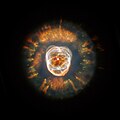Dosya:Ngc2392.jpg
Görünüm

Bu önizlemenin boyutu: 600 × 600 piksel. Diğer çözünürlükler: 240 × 240 piksel | 480 × 480 piksel | 768 × 768 piksel | 1.024 × 1.024 piksel | 1.500 × 1.500 piksel.
Tam çözünürlük ((1.500 × 1.500 piksel, dosya boyutu: 1,16 MB, MIME tipi: image/jpeg))

|
Bu bir seçkin resimdir. Vikipedi topluluğu tarafından güzel, şaşırtıcı, etkileyici ve/veya bilgilendirici bulunan bu resme seçkin resim statüsü verilmiş ve kullanıldığı maddeye önemli ölçüde katkı sağladığına karar verilmiştir. Eğer benzer kalitede özgür lisans etiketli bir resminiz varsa, yükleyebilir ve aday gösterebilirsiniz. |
| Bu resim 31 Mayıs 2009 tarihinde Türkçe Vikipedi'de günün seçkin resmi olmuştur. |
| Bu resim 8 Aralık 2013 tarihinde Türkçe Vikipedi'de günün seçkin resmi olmuştur. |
| Bu resim 20 Aralık 2016 tarihinde Türkçe Vikipedi'de günün seçkin resmi olmuştur. |
Dosya geçmişi
Dosyanın herhangi bir zamandaki hâli için ilgili tarih/saat kısmına tıklayın.
| Tarih/Saat | Küçük resim | Boyutlar | Kullanıcı | Yorum | |
|---|---|---|---|---|---|
| güncel | 12.34, 28 Temmuz 2005 |  | 1.500 × 1.500 (1,16 MB) | Startaq | |
| 17.20, 1 Şubat 2005 |  | 320 × 259 (12 KB) | CWitte | Eskimo nebula |
Dosya kullanımı
Bu görüntü dosyasına bağlantısı olan sayfalar:
- Caldwell kataloğu
- Eskimo Bulutsusu
- Gezegenimsi bulutsu
- Gezegenimsi bulutsular listesi
- Kullanıcı mesaj:Dsmurat/Mart 2008
- Vikipedi:Günün seçkin resmi/Aralık 2013
- Vikipedi:Günün seçkin resmi/Aralık 2016
- Vikipedi:Günün seçkin resmi/Mayıs 2009
- Vikipedi:Seçkin resim adayları/Arşiv/Mart 2008
- Vikipedi:Seçkin resim adayları/Ngc2392.jpg
- Vikipedi:Seçkin resimler/Ana sayfaya çıkmış resimler/2009 listesi
- Vikipedi:Seçkin resimler/Ana sayfaya çıkmış resimler/2013 listesi
- Vikipedi:Seçkin resimler/Uzay/Uzaya bakış
- Şablon:GSR/2009-05-31
- Şablon:GSR/2013-12-08
- Şablon:GSR/2016-12-20
Küresel dosya kullanımı
Aşağıdaki diğer vikiler bu dosyayı kullanır:
- af.wikipedia.org üzerinde kullanımı
- ar.wikipedia.org üzerinde kullanımı
- arz.wikipedia.org üzerinde kullanımı
- ast.wikipedia.org üzerinde kullanımı
- az.wikipedia.org üzerinde kullanımı
- be.wikipedia.org üzerinde kullanımı
- bg.wikipedia.org üzerinde kullanımı
- bn.wikipedia.org üzerinde kullanımı
- bs.wikipedia.org üzerinde kullanımı
- ca.wikipedia.org üzerinde kullanımı
- ce.wikipedia.org üzerinde kullanımı
- cs.wikipedia.org üzerinde kullanımı
- cv.wikipedia.org üzerinde kullanımı
- da.wikipedia.org üzerinde kullanımı
- de.wikipedia.org üzerinde kullanımı
- diq.wikipedia.org üzerinde kullanımı
- el.wikipedia.org üzerinde kullanımı
- en.wikipedia.org üzerinde kullanımı
- Planetary nebula
- Compact object
- Eskimo Nebula
- List of planetary nebulae
- User:Anticipation of a New Lover's Arrival, The/Galleries/Awards
- Caldwell catalogue
- Herschel 400 Catalogue
- User:Reginhild
- Wikipedia:Featured picture candidates/May-2007
- Wikipedia:Featured picture candidates/Eskimo Nebula
- User:Reginhild/Userboxes/Space Scientist
- Gemini (constellation)
Bu dosyanın daha fazla küresel kullanımını görüntüle.
